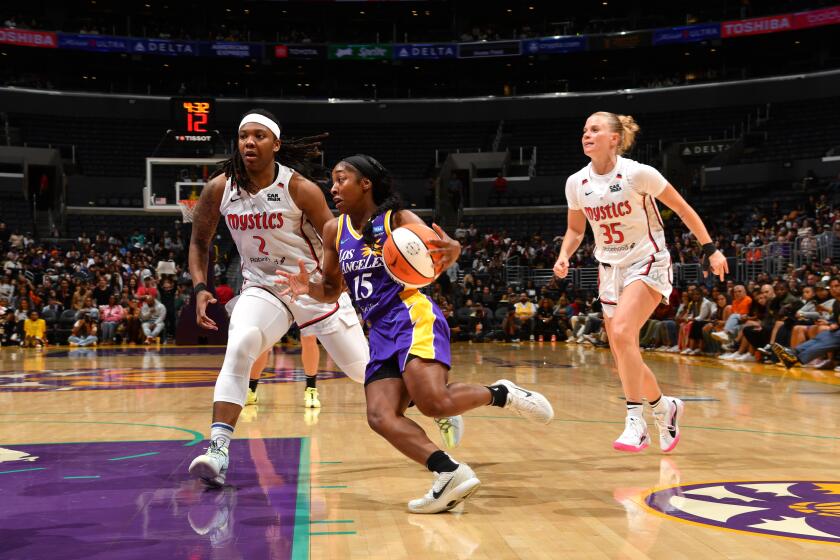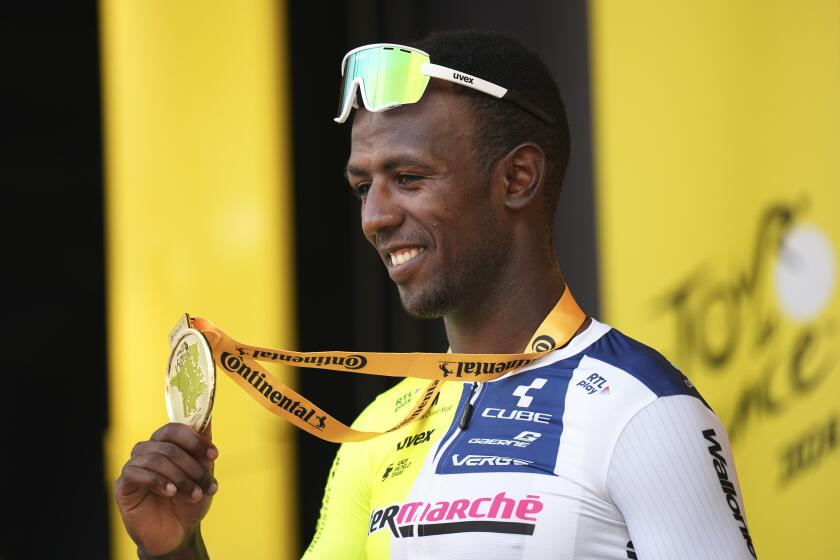A DREAM ON HOLD : Pro Baseball Awaits, but Steverson Will Take College Detour
Todd Steverson seems like most other recent high school graduates.
He’s 17, and his room is messy--but his thoughts are clear.
Best of all, his destiny rests comfortably in his hands. It’s with those hands that he hopes to grip a wooden bat and become a major league baseball star.
To really know Todd Steverson and understand his dreams, you need look no further than his room.
His personal life is right next to his twin-size bed. There’s a small table upon which rest a picture of his girlfriend and the red velvet crown he was awarded for being king of the senior prom.
The walls and the shelves are adorned with trophies, medals and pictures, representing his athletic life. He is especially proud of his high school team picture and a snapshot of himself looking for all the world like Bo Jackson of the Kansas City Royals. They even wear the same number, 16.
But on the other side of the room are symbols of the conflict he has had to deal with. There is a poster of a smiling man dressed in regal clothing, holding a glass of champagne while sitting on the hood of a vintage Rolls-Royce. The caption in big, bold, unmistakable type says, “Poverty Sucks.”
“I plan on having money,” Steverson said. “And I do not plan on having to work hard for a living.”
Again, Steverson seems no different from most others.
Steverson is said to be a “can’t miss” outfield prospect by major league baseball scouts. Some even say he has more potential than did Darryl Strawberry, the New York Met star from L.A. Crenshaw High.
So, the options were clear enough. It was the decision that was difficult.
On one hand, he could have signed with the pros right out of high school for a possible bonus of $300,000.
On the other, the one favored by his family, was college.
College is what he and the family chose, gambling that he could go, play baseball while continuing his education, and sign for even more money after his junior year. It sounds good, but one injury can make a “bonus baby” worthless.
There was no doubt that Todd was being pulled in more directions than a teen ought to be. But turmoil is nothing new to him.
For starters, Steverson lives in Marina del Rey but attends Culver City High School. That situation stems from the divorce of Richard and Patricia Steverson after 10 years of marriage.
Steverson initially lived with his mother. But when his father remarried two years ago, Todd was sent to live with him in Marina del Rey along with his older brother and stepsister.
“I didn’t want to come here at all,” Steverson recalled. “I just asked, ‘Why am I leaving when I don’t want to leave?’ The decision was made between my mom and dad and I did not cope well with it. I wanted to be back in Culver City, close to my friends.
“The fact that I was living with a stepmother did not excite me very much. It just took a while for me to get accustomed here.”
But a pattern was starting to develop. Despite the split, Steverson’s future was considered a family decision and his vote carried no special weight.
Richard Steverson is an account manager for AT&T.; He was determined that his son attend college, and Todd signed a letter of intent to attend Arizona State.
However, a letter of intent only binds a player to that college if he elects to go to college. Steverson hadn’t quite made up his mind, but his father had.
“We as a family set goals and objectives to reach,” Richard Steverson said. “With Todd, we felt at this time we need to establish value. Baseball calling on us now is a fulfillment of one of our goals. But, at this juncture of Todd’s baseball career, we will have to pass.”
Professional scouts stayed in touch with Todd, however, and the arm-twisting was less than subtle. The scouts saw a commodity and they thought the market was bullish.
In an effort to lessen the pressure, Richard sent a letter in May to baseball Commissioner Bart Giamatti, asking that his son’s name not be included in the June draft.
“I wanted to let baseball know that we meant business when we said we’d honor our commitment to Arizona State,” the elder Steverson said. “We know that once Todd sets foot in a classroom in the fall, professional baseball cannot touch him until his junior year.”
But as the draft neared, rumors circulated that the Steversons were using the letter as a bargaining tool.
Baseball publications even started questioning the decision to go to college. But the most stinging remark was in Baseball America, which praised Todd’s abilities but added, “Steverson isn’t a top student, and his family isn’t wealthy.”
Scouts would call Richard Steverson, telling him that it was senseless to send his son to college because if the young man’s goal was to be a professional player, he could not be regarded any more highly than he is now and that they would pay for his education. It was professional baseball’s way of covering all of its bases.
On draft day, the St. Louis Cardinals took a chance and drafted Steverson in the sixth round.
“We drafted Todd as a flyer,” said Marty Keough, the Cardinals’ West Coast scouting supervisor. “If he changed his mind, we wanted it to be with us and not with any other team. Having him go to school is like Darryl Strawberry going to college.
“If Todd wanted to study, he should have went to Stanford. It is obvious that he is going to college to play baseball and the time he will waste there, he could be gaining professionally. I very strongly feel that Todd is making the biggest mistake in the world. And I have told his father this, too.”
Chuck Menzhuber, the Cardinals’ Southern California scout, has known Todd Steverson for three years and considers him a close friend. Menzhuber also thinks that he is ready to play professionally.
“I have told him that he is definitely ready,” Menzhuber said. “He is in a class with (Seattle Mariner star rookie) Ken Griffey Jr., and he could make it to the majors just as fast.”
Griffey played in the minor leagues for one season.
“This is a hard choice for a young man,” Menzhuber said. “Todd will not be 18 until November and all he wants to do is play baseball. I think he has been going back and forth with his decision for a while, whether to take the money and have it in the bank or be tied up for three years and then hope to be on the doorsteps of the big leagues, like he is now.”
Todd’s answer to that is simple.
“Next year, they will all be doing the same thing,” he said. “They will find another player like me and will start telling him what they are telling me now and the cycle will continue.”
The consensus in the Steverson family is that Todd was born to play baseball.
At five months, he was already using his arms to push himself up.
When he was 2, he picked up a plastic bat and ball for the first time and batted the ball across the street, on the fly. His grandmother said, “There goes the ballplayer of the family.”
Steverson says baseball is his specialty. At 6-foot-2 and 175 pounds, he has the look of a natural athlete but says that he is not a great basketball player and that he barely survived two seasons of high school football.
At home, Todd does not get special treatment. In fact, Richard teases Todd about his complexion and the girls he dates. Todd acknowledges having had a little black book a year ago, but now has one girlfriend, Karen Sebata, a junior at Culver City High.
“I know I am going to miss her when I go away to school, but I will be home as often as possible,” he said. “We are going to stay together.”
Sebata said that Todd’s uncanny ability to land on his feet will help him live with his college decision.
“Everything always seems to work out for Todd,” she said. “Whenever something goes wrong, he has a special ability to make it turn out great. He may have been curious about playing professional baseball, but I think he made the right decision.”
The turning point in Steverson’s life occurred last year, during his junior season, when he was regarded as a good prospect but not a great one. His skills were there, but he hadn’t put them together. And instead of getting off to a quick start, Todd was taken off the team by his father because his grades did not meet family standards.
“We took him out of baseball for more than a month to punish him for not getting the grades we wanted from him,” Richard said. “We were looking at the total package and not just a baseball player. We wanted a certain grade-point average for a semester and he did not get it.”
It was a frustrating time for Todd.
“I was just one letter grade below,” he said. “I needed a B and I got a C. I was really mad because I thought I was being deprived unfairly.”
His father stood his ground, however, making Todd bring home weekly grade reports until there was improvement.
“At this time, Proposition 48 was in effect, and this was our response to it,” Richard said. “If Todd was using baseball as a vehicle, he would have to hold his commitment. I was prepared to keep him out for the entire year. We were just trying to show him that baseball should not be the highest priority in his life.”
And that summer, Todd made a baseball breakthrough as well. In the prestigious California Area Code Games in San Diego, a series of all-star games involving the top high school players in the state, Todd was voted most valuable player.
His performance caught the attention of the professional and college scouts.
“My son went to those games not really a big-name player to baseball scouts,” Richard Steverson said. “Once the tournament was over, Todd left a lot of people with no doubt in their minds that this was a baseball player. Most of all, his attitude left the scouts feeling that this is a player that I want to have in my organization.”
Todd also was selected to play on the United States Goodwill Games team in Japan last August. Once he returned, the pressure from baseball scouts started to build.
The first major decision Todd had to make was in choosing Arizona State. Schools all over the country were in pursuit and the callers were all trying to tell him what they thought he wanted to hear.
“When it came down to it, I just wanted to get away from here and be on my own,” Todd said. “Arizona State was the last trip I took, and I left a day after Christmas. Aside from getting an education I want to go to college and have fun, while gaining a learning experience. I found that at Arizona State.”
Jim Brock, Arizona State’s baseball coach, has had his share of blue-chip prospects in his 18 years as coach, but he also realized that Todd was a special case.
“It is very unusual to have someone that would be drafted as high as Todd to not go pro,” he said. “We have been blessed to have a lot of ‘can’t miss’ talent enroll here. It is something that perpetuates itself.”
In the 1980s, the Sun Devils have had several bona fide pro prospects, among them Barry Bonds of the Pittsburgh Pirates, Oddibe McDowell of the Atlanta Braves and current Sun Devil star Mike Kelly. Brock says that if a prospect he has coached has to spend more than a year in the minor leagues, he has failed as a coach. That fits in perfectly with Todd’s baseball plans.
When Brock met Todd and his family, he knew this was a different type of family, because Richard turned the visit into a thorough interview.
“I was in there for about three hours and Richard really was putting it to me, the way it should be when a coach comes into your home,” Brock said. “Finally, at the end, he asks me to summarize my philosophy as a coach and a person in one sentence. I told him I could do it in three words; ‘I’m a hardass.’ ”
Brock’s response was what Richard Steverson was looking for. He did not want to send Todd to a program where his son would be catered to.
“I am not letting Todd go to Arizona State to let Brock be his surrogate parent,” Richard said. “He is there to coach and to help Todd as a baseball player. Brock is just a baseball coach to me. I expect him to push Todd in the W-L (won and lost) column because Todd will make his own way. Arizona State is just a part of his life, not everything.”
A side effect of successful recruiting is that coaches sometimes fall prey to jokes by their prizes. Todd and fellow Sun Devil signee Ryan Klesko of Westminster High School had some fun with Kendall Carter, Arizona State’s recruiting coordinator.
“Ryan was supposed to set him up for me at first but he couldn’t do it with a straight face,” Todd said. “So I called Kendall up and told him that Ryan had taken the offer made by the Braves. There was a long pause on the phone and then he said, ‘Huh?’
“I told Kendall, ‘Yeah, they offered him a lot of money and he took it.’ Kendall then asked if Ryan was there and Ryan got on the phone and said ‘Yeah, Kendall.’ Then I heard Kendall yelling. We got him good.”
The joke became serious, however, when Klesko signed with the Braves for a bonus of $160,000 three weeks later.
“I was surprised when he did sign,” Steverson said. “He had sounded so positive about Arizona State when I last talked with him. I think he just got caught up in the hype. The Braves dressed him up in full uniform and had him take batting practice with the team when they were in town playing the Dodgers.
“In Ryan’s case, I guess that everything worked out because the money they gave him is about what he is worth.”
With several weeks remaining until Steverson is actually an Arizona State student, there is still a chance that he might also change his mind and sign professionally. But he says that isn’t likely.
“I am definitely going to college because I want to,” he said. “I want to have fun at this point in my life and I want to experience being away from home as a college student. If you worry about getting hurt all of the time, you probably will. But, I’m not, so I do not expect to get injured.”
Todd Steverson is starting the next phase of his life. Has he made the right decision? Will he ever be a baseball star?
Those questions can’t be answered yet.
So is Todd Steverson different from most other recent high school graduates?
Hardly.
More to Read
Get our high school sports newsletter
Prep Rally is devoted to the SoCal high school sports experience, bringing you scores, stories and a behind-the-scenes look at what makes prep sports so popular.
You may occasionally receive promotional content from the Los Angeles Times.






